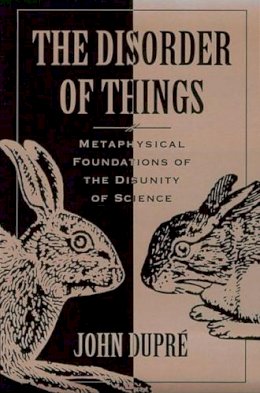

Stock image for illustration purposes only - book cover, edition or condition may vary.
The Disorder of Things: Metaphysical Foundations of the Disunity of Science
John Dupre
€ 5.91
FREE Delivery in Ireland
Description for The Disorder of Things: Metaphysical Foundations of the Disunity of Science
paperback. This text sytematically attacks the 20th-century ideal of scientific unity by showing how its underlying assumptions are at odds with the central conclusions of science itself. It proposes in its place a metaphysics much more in keeping with what science reveals to the observer about the world. Num Pages: 320 pages, 1 line illustration. BIC Classification: HPJ; PDA. Category: (P) Professional & Vocational; (UP) Postgraduate, Research & Scholarly; (UU) Undergraduate. Dimension: 229 x 155 x 19. Weight in Grams: 456. Good clean copy with minor shelfwear, remains very good
The great dream of philosophers and scientists for millennia has been to give us a complete account of the order of things. A powerful articulation of such a dream in this century has been found in the idea of a unity of science. With this manifesto, John Dupré systematically attacks the ideal of scientific unity by showing how its underlying assumptions are at odds with the central conclusions of science itself. In its stead, the author gives us a metaphysics much more in keeping with what science tells us about the world. Elegantly written and compellingly argued, this provocative book will be important reading for all philosophers and scholars of science.
Product Details
Format
Paperback
Publication date
1995
Publisher
Harvard University Press
Condition
Used, Very Good
Number of Pages
320
Place of Publication
Cambridge, Mass, United States
ISBN
9780674212619
SKU
KSG0033295
Shipping Time
Usually ships in 2 to 4 working days
Ref
99-1
About John Dupre
John Dupré is Associate Professor of Philosophy at Stanford University and the editor of The Latest on the Best: Essays on Evolution and Optimality.
Reviews for The Disorder of Things: Metaphysical Foundations of the Disunity of Science
Dupré’s book is original, lucid and confident, without being eccentric, polemical or arrogant. It deserves close attention… Dupré insists that there is no general scientific method, process, or attitude… He pins down the notion of the unity of science as a form of scientism appropriate only to a Utopia or to totalitarianism. He notes that ‘paradoxically, with the disunity of science comes a kind of unity of knowledge.’ That is why, to my mind, this is just the kind of philosophical teaching that is needed to close the gap between the two cultures.
John Ziman
Nature
The thesis of ‘disorder’ has revolutionary implications for the practice of science… [This book] should be read by every student of the subject as an antidote to current philosophical correctness, and it should indeed suggest to professionals that many of the fashionable empires of analytic philosophy as well as philosophy of science are not well-clothed.
Mary Hesse
International Studies in the History and Philosophy of Science
John Ziman
Nature
The thesis of ‘disorder’ has revolutionary implications for the practice of science… [This book] should be read by every student of the subject as an antidote to current philosophical correctness, and it should indeed suggest to professionals that many of the fashionable empires of analytic philosophy as well as philosophy of science are not well-clothed.
Mary Hesse
International Studies in the History and Philosophy of Science
